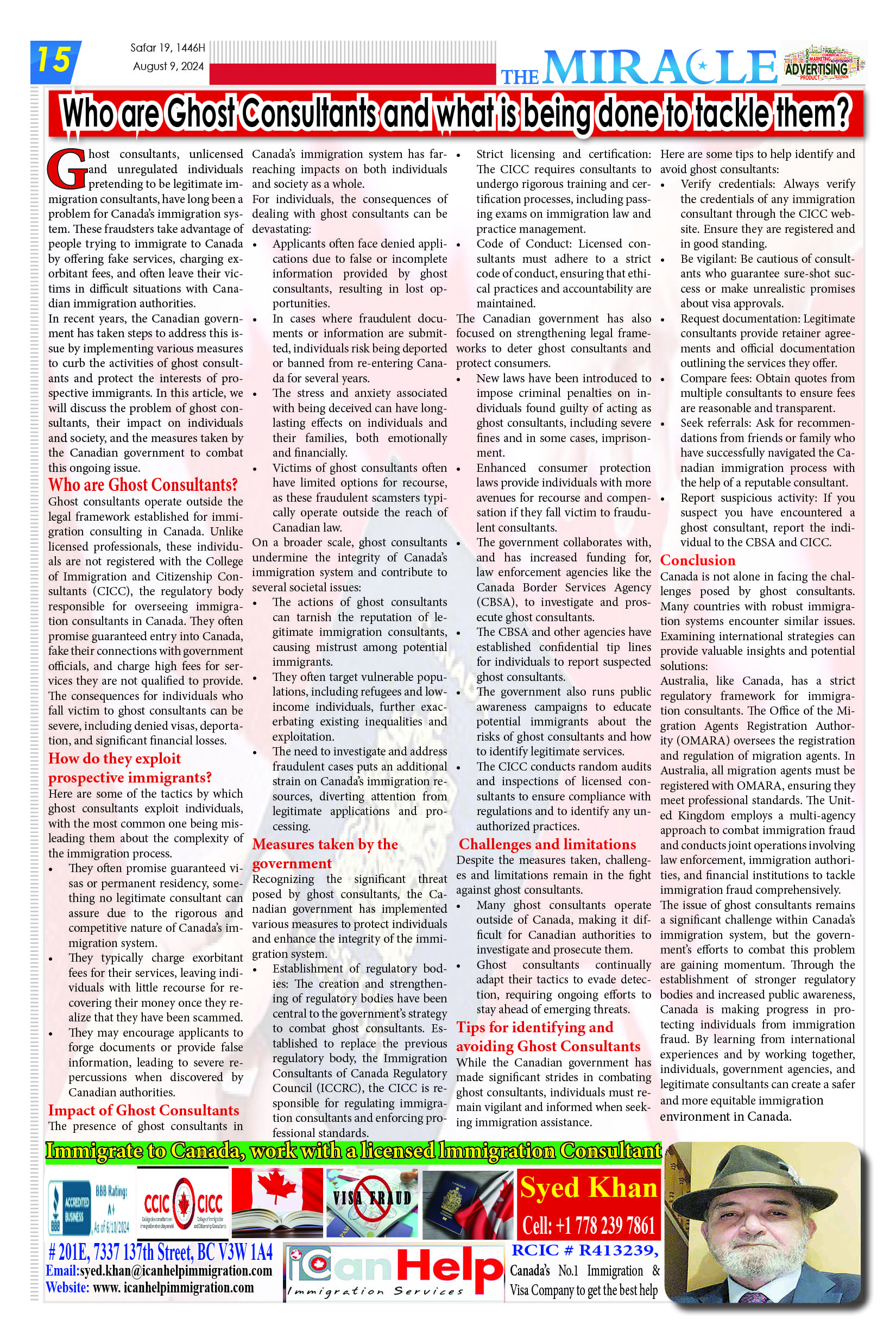- info@icanhelpimmigration.com
- Suite # 201 E, 7337 137 Street, Surrey, BC V3W 1A4
- Mon - Sat: 10:00 AM to 6:00 PM
Blog Details
Fri
Aug
Who are Ghost Consultants and what is being done to tackle them?
Who are Ghost Consultants and what is being done to tackle them?
Ghost consultants, unlicensed and unregulated individuals pretending to be legitimate immigration consultants, have long been a problem for Canada's immigration system. These fraudsters take advantage of people trying to immigrate to Canada by offering fake services, charging exorbitant fees, and often leave their victims in difficult situations with Canadian immigration authorities. In recent years, the Canadian government has taken steps to address this issue by implementing various measures to curb the activities of ghost consultant and protect the interests of prospective immigrants. In this article, we will discuss the problem of ghost consultants, their impact on individuals and society, and the measures taken by the Canadian government to combat this ongoing issue.
Who are Ghost Consultants?
Ghost consultants operate outside the legal framework established for immigration consulting in Canada. Unlike licensed professionals, these individuals are not registered with the College of Immigration and Citizenship Consultants (CICC), the regulatory body responsible for overseeing immigration consultants in Canada. They often promise guaranteed entry into Canada, fake their connections with government officials, and charge high fees for services they are not qualified to provide. The consequences for individuals who fall victim to ghost consultants can be severe, including denied visas, deportation, and significant financial losses.How do they exploit prospective immigrants?
Here are some of the tactics by which ghost consultants exploit individuals, with the most common one being misleading them about the complexity of the immigration process.
● They often promise guaranteed visas or permanent residency, something no legitimate consultant can assure due to the rigorous and competitive nature of Canada's immigration system.
● They typically charge exorbitant fees for their services, leaving individuals with little recourse for recovering their money once they realize that they have been scammed.
● They may encourage applicants to forge documents or provide false information, leading to severe repercussions when discovered by Canadian authorities.
Impact of Ghost Consultants
The presence of ghost consultant in Canada's immigration system has far-reaching impacts on both individuals and society as a whole. For individuals, the consequences of dealing with ghost consultants can be devastating:
● Applicants often face denied applications due to false or incomplete information provided by ghost consultants, resulting in lost opportunities.
● In cases where fraudulent documents or information are submitted, individuals risk being deported or banned from re-entering Canada for several years.
● The stress and anxiety associated with being deceived can have long-lasting effects on individuals and their families, both emotionally and financially.
● Victims of ghost consultants often have limited options for recourse, as these fraudulent scamsters typically operate outside the reach of Canadian law.
On a broader scale, ghost consultants undermine the integrity of Canada's immigration system and contribute to several societal issues:
● The actions of ghost consultants can tarnish the reputation of legitimate immigration consultants, causing mistrust among potential immigrants.
● They often target vulnerable populations, including refugees and low-income individuals, further exacerbating existing inequalities and exploitation.
● The need to investigate and address fraudulent cases puts an additional strain on Canada's immigration resources, diverting attention from legitimate applications and processing.
Measures taken by the government
Recognizing the significant threat posed by ghost consultants, the Canadian government has implemented various measures to protect individuals and enhance the integrity of the immigration system.
● Establishment of regulatory bodies: The creation and strengthening of regulatory bodies have been central to the government's strategy to combat ghost consultant. Established to replace the previous regulatory body, the Immigration Consultants of Canada Regulatory Council (ICCRC), the CICC is responsible for regulating immigration consultants and enforcing professional standards.
● Strict licensing and certification: The CICC requires consultants to undergo rigorous training and certification processes, including passing exams on immigration law and practice management.
● Code of Conduct: Licensed consultants must adhere to a strict code of conduct, ensuring that ethical practices and accountability are maintained.
The Canadian government has also focused on strengthening legal frameworks to deter ghost consultants and protect consumers.
● New laws have been introduced to impose criminal penalties on individuals found guilty of acting as ghost consultant, including severe fines and in some cases, imprisonment.
● Enhanced consumer protection laws provide individuals with more avenues for recourse and compensation if they fall victim to fraudulent consultants.
● The government collaborates with, and has increased funding for, law enforcement agencies like the Canada Border Services Agency (CBSA), to investigate and prosecute ghost consultants.
● The CBSA and other agencies have established confidential tip lines for individuals to report suspected ghost consultants.
● The government also runs public awareness campaigns to educate potential immigrants about the risks of ghost consultants and how to identify legitimate services.
● The CICC conducts random audits and inspections of licensed consultants to ensure compliance with regulations and to identify any unauthorized practices.
Challenges and limitations
Despite the measures taken, challenges and limitations remain in the fight against ghost consultants.
● Many ghost consultants operate outside of Canada, making it difficult for Canadian authorities to investigate and prosecute them.
● Ghost consultant continually adapt their tactics to evade detection, requiring ongoing efforts to stay ahead of emerging threats.
Tips for identifying and avoiding Ghost Consultants
While the Canadian government has made significant strides in combating ghost consultant, individuals must remain vigilant and informed when seeking immigration assistance. Here are some tips to help identify and avoid ghost consultants:
● Verify credentials: Always verify the credentials of any immigration consultant through the CICC website. Ensure they are registered and in good standing.
● Be vigilant: Be cautious of consultants who guarantee sure-shot success or make unrealistic promises about visa approvals.
● Request documentation: Legitimate consultants provide retainer agreements and official documentation outlining the services they offer.
● Compare fees: Obtain quotes from multiple consultants to ensure fees are reasonable and transparent.
● Seek referrals: Ask for recommendations from friends or family who have successfully navigated the Canadian immigration process with the help of a reputable consultant.
● Report suspicious activity: If you suspect you have encountered a ghost consultant, report the individual to the CBSA and CICC.











